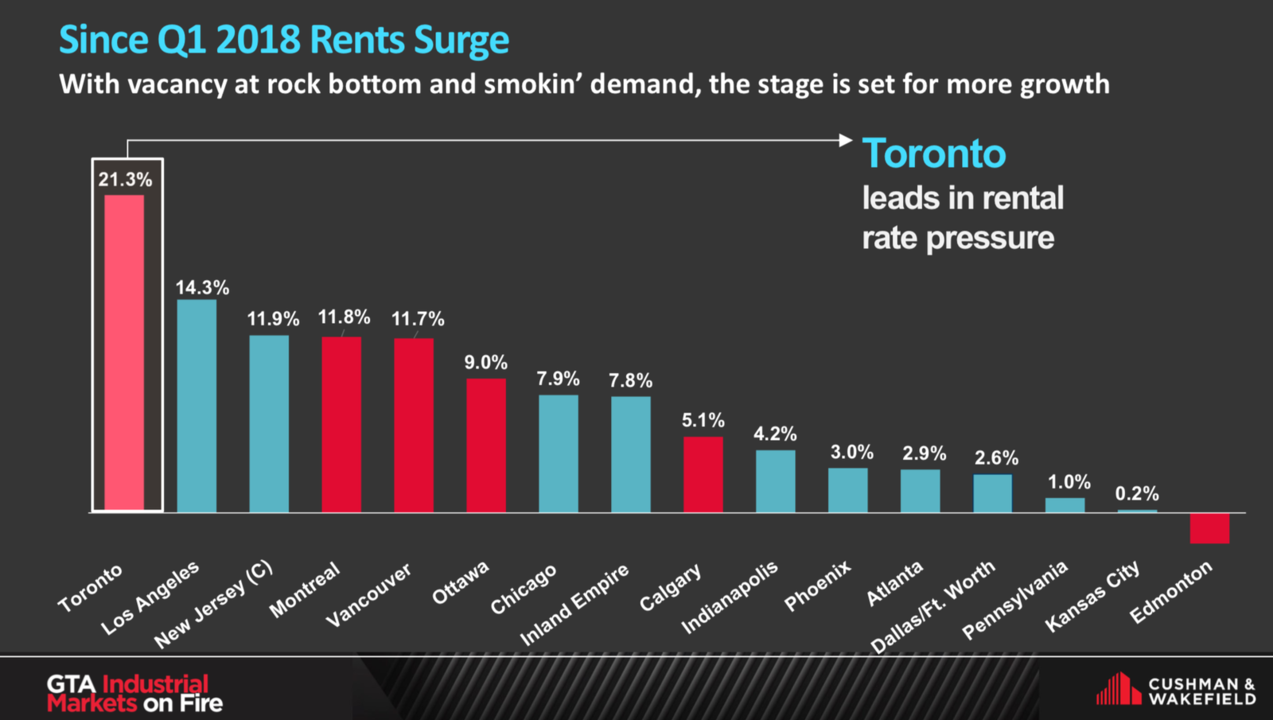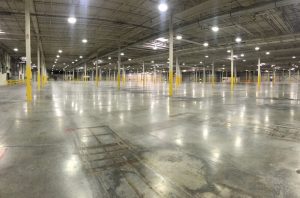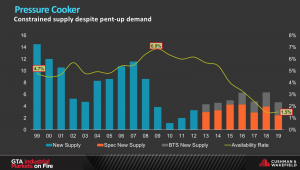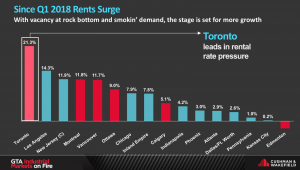
How to successfully renew your lease in a tight market…
Let’s say you currently occupy a space that works for you. It perfectly meets your needs.
Your lease is up in 18 to 24 months, maybe even three years from today, and, you heard that rental rates are moving up so you wanted to be proactive…
And net rental rates did move up significantly….
This is because the GTA Industrial market vacancy rates are at the lowest level ever and there is no relief on the horizon (see our past few issues for a complete breakdown on why we believe this to be the case).
So what can you do to ensure you have some options going forward?
Well, there’s one key strategy you must have in order to negotiate successfully (which we’ll reveal later on), however, above all else…
Start the process early!
I am writing this because in the last week alone we met with two clients whose leases will expire in Q4 2020. As part of our strategic development, we conducted market research and found very few options for them at this moment.
Does this mean we won’t find them a solution? No, it doesn’t. Yet if they had been looking to renew 6 months out, they would have been forced to pay up or relocate.
Lease Renewals are potentially the most commonly misunderstood and least utilized tool for:
- improving your bottom line,
- mitigating future risks, and
- increasing flexibility.
Renewal options typically occur every five or ten years, and quite often, Tenants are busy running their business and not paying much attention to notice periods in the Lease as well as current market conditions.
In order to succeed with renewals, you must utilize one crucial strategy; and that is leverage.
Leverage is needed to negotiate from a position of strength. And it comes from knowing what the other side is thinking, feeling, and experiencing; while not being needy yourself.
Without understanding current market conditions and the landlord’s specific circumstances you will always be at a disadvantage. And being short on time, money, or options can make you lose all control. We’ll break this down further below.
Now, a few points should be considered when negotiating a successful lease renewal:
FIRST: What is the renewal option?
One of the crucial terms to consider when negotiating a lease is the renewal clause. The renewal clause grants the tenant an option (or several) to renew the lease for a set term (or several) after the expiry of the initial term. It is important that such renewal rent can be fairly negotiated or determined, and that the option to renew cannot be revoked for minor infractions under the lease.
The renewal option allows a tenant to renew its lease for a predetermined period of time on terms stipulated in the Lease Agreement. Most often, the option must be exercised within a specific time frame, usually not earlier than 12 months, and no later than 6 months, prior to the expiration of the initial term. During that period, negotiation of the rent payable, and any other items to be determined, takes place.
It is common for a renewal term to be continued on the same terms and conditions of the lease, with the exception of:
- rent,
- any financial incentives offered to the tenant for the initial term (such as a tenant’s improvement allowance), and
- the renewal clause itself.
The renewal option is guaranteed to be extended at the then market value; usually defined by rates set by comparable lease transactions for similar premises in a similar area.
Further, as per the provision in the Lease Agreement, the net rent in the first year of the renewal term is not to be less than the rental rate in the last year of the original or preceding term of the lease.
Lastly, most renewal rights are contingent on the tenant not being in default at the time the option to renew can be exercised or having never defaulted under the terms of the lease at any time during the initial term.
Why you should have a renewal option?
Renewal options are crucial because they offer protection for tenants, especially if the tenant invested a considerable amount of capital to set up its business. An early termination or relocation contrary to the Tenant’s plans could be devastating for the business.
What usually happens when lease term comes up?
We basically see two scenarios.
First, tenants’ needs change over time, and they may not need the same amount of space they did at the beginning of the lease term. Businesses may require larger premises if the company is growing or less space if either the anticipated growth never materialized, or the company is winding down its operations. In this case, the tenant would simply let the renewal right lapse and look for new premises.
Secondly, the space may work and there is no need to relocate. Here, we hope that Tenants are mindful of their notice periods and are not late exercising their rights on time.
If the Tenant does punctually notify their Landlord of their intent to renew, the only unknown that must be decided is the net rental rate for the extension term.
That’s normally it, as the Lease Agreement usually states the Tenant can renew under the same terms and conditions.
So how can we decide the new rental rate?
This is normally determined at the “then market value” for similar premises, along with other factors. In many cases, it is subject to arbitration in the event the Tenant and Landlord can’t agree on what that value is for the leased premises.
Yet the key phrase here is: “then market value”…
If you are occupying an industrial building in the Greater Toronto Area and your lease is coming up within the next two to three years, that means you must have executed your lease three, five, or even ten years ago. You may have negotiated a flat rate for the term or you may have been subject to some escalations over the term.
GTA Industrial Vacancy Rates – Source: Cushman & Wakefield ULC
With GTA Industrial vacancy rates of 1.5% and less and net rental rates growth of more than 20% over the last year, you may be in for a big surprise.
GTA Industrial Rental Rates Increase Q1 2018 to Q1 2019 – Source: Cushman & Wakefield ULC
If you wait until the last moment (and in this case, the last moment could be qualified as your six to twelve months prior to the expiry of the term) you may not have any options in the market or any leverage to negotiate terms for your lease renewal.
Have I mentioned this already?
Start Early!
If your lease expires in the next two to three years you need to start the process…
Here’s how you can.
Understand your notice periods
It is important to know exactly what your notice periods are. As mentioned earlier, most notice periods are six to twelve months prior to the expiry of the lease.
Who is keeping track of these timelines?
Have you completed a Lease Abstract so that you can see the overview of all of the important lease terms and dates in one place?
Missing these dates could create big problems down the road…
Understand your business needs
It is sometimes difficult to predict what might happen two to three years in the future but you should have a clear understanding of your business needs today.
Here are some prompts:
- Knowing what the optimum size for your business is today,
- How many SF of space you occupy at the moment at different locations,
- Is it the right moment for a potential consolidation?,
- Has your business changed?,
- Can you achieve better efficiencies with a higher ceiling height in the warehouse area?,
- Do you require more office space?,
- Is your current parking for vehicles and trucks adequate?, etc….
Or maybe your space already expired prior to the lease expiry date?
Understanding all of the above will impact your decision to renew, when you should renew, how long you should renew for, and how to structure your lease to maintain flexibility.
Understand current market conditions
Knowing the current market in your area, the vacancy rates, net rental rates, market trends, absorption, new construction, tenant improvements, concessions, etc. is very important to reach a favorable deal.
Create leverage
Creating leverage is everything.
Leverage is the power that one side of a negotiation has to influence the other side to move closer to their negotiating position. A party’s leverage is based on its ability to award benefits or impose costs on the other side.
The party that has the most to lose from a “no deal” outcome has less leverage than the party that has the least to lose.
Individuals with strong leverage can sometimes overcome weak negotiating skills, whereas those with poor leverage have a reduced likelihood of being successful even if they have strong negotiating skills.
This is important to note because it means the side that is best positioned and prepared will outperform the best negotiators any day of the week.
And you can create leverage by:
- Conducting market research today and knowing your options (hopefully there are few),
- Developing a Strategy, and
- Approaching your Landlord (the earlier the better).
The outcome of this is:
- You will be able to evaluate your current position against the market,
- If your “space expired” and you don’t find any options in the market today, you still have a year or two prior to the expiry of your lease.
- If you find alternative options better than your current location, you can still commit to the new location and sublease your existing space. Chances are, you negotiated your lease terms years ago and rental rates are way below the market today. You will be able to sublease with no issues (or the Landlord may be happy to take over the property earlier and release it at higher rates).
- If your current space still works for you (there is no need to “right size”), you will be negotiating your renewal rates today vs negotiating a year or two down the road, thus, securing net rental rates today will be most likely 20% – 40% less expensive then negotiating the same one to two years from now.
The bottom line is:
- If you communicate to the Landlord that there is a potential for your relocation you will put yourself in a position for a true business negotiation based on concrete facts, and
- In the event your space already expired you are better off relocating early and transacting at today’s rates.
Negotiate maximum concessions
Negotiation with leverage is the final piece to a successful renewal process. Once you understand your current business needs, have a handle on the current market, and have created leverage, you are able to negotiate from a position of strength.
The objective of a successful renewal (or relocation if need be) is to come to an agreement that will be based on fair market value today.
Conclusion
Renewing your lease is part leverage, part positioning, part timing, and part luck. Yet all of these risks can be mitigated or removed by starting early.
Just like other areas of life, those who are best prepared will reap the benefits. And when it comes to securing the right space for your needs, a little bit of work early on can pay off for many years to come… so don’t put it off until it’s too late.
If that is you, feel free to reach out and inquire about off-market opportunities, or to get an assessment of your situation and needs.
Until next week….
Goran Brelih and his team have been servicing Investors and Occupiers of Industrial properties in Toronto Central and Toronto North markets for the past 25 years.
Goran Brelih is a Senior Vice President for Cushman & Wakefield ULC in the Greater Toronto Area.
Over the past 27 years, he has been involved in the lease or sale of approximately 25.7 million square feet of industrial space, valued in excess of $1.6 billion dollars while averaging between 40 and 50 transactions per year and achieving the highest level of sales, from the President’s Round Table to Top Ten in GTA and the National Top Ten.
Goran is currently serving as President of the SIOR ‐ Society of Industrial and Office Realtors, Central Canadian Chapter and on the Board of Directors of Muki Baum Accessibility Centre, a Toronto‐based NGO which provides support to children and adults with complex disabilities.
Specialties:
Industrial Real Estate Sales and Leasing, Investment Sales, Design Build and Land Development
About Cushman & Wakefield ULC.
Cushman & Wakefield is a leading global real estate services firm that delivers exceptional value by putting ideas into action for real estate occupiers and owners. Cushman & Wakefield is among the largest real estate services firms with 48,000 employees in approximately 400 offices and 70 countries.
In 2017, the firm had revenue of $6.9 billion across core services of property, facilities and project management, leasing, capital markets, advisory, and other services. To learn more, visit www.cushmanwakefield.com or follow @CushWake on Twitter.
For more information on GTA Industrial Real Estate Market or to discuss how they can assist you with your real estate needs please contact Goran at 416-756-5456, email at goran.brelih@cushwake.com, or visit www.goranbrelih.com.





